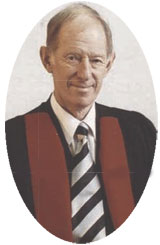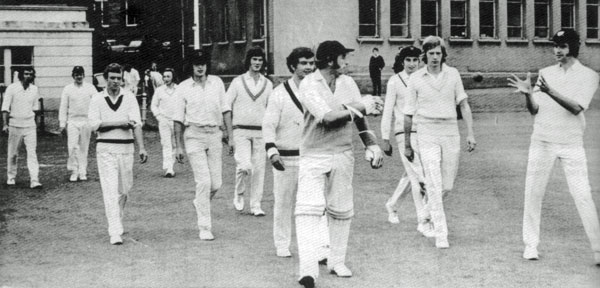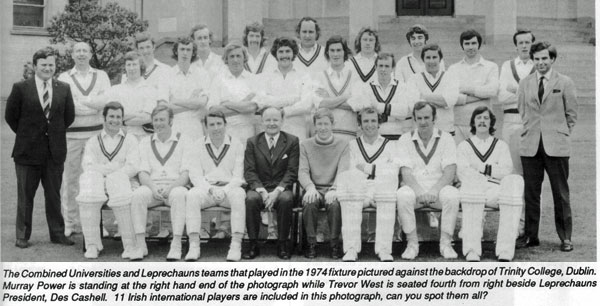Although Ireland's two premier university clubs — Dublin University and Queen's University, Belfast — have a venerable tradition, the elder being now over 155 years old and the younger a mere 120, it was not until March 1974 that an Irish Universities Cricket Association was founded. At the time both Trinity and Queen's had been enjoying considerable success, the Dubliners winning the Leinster Senior League under Mike Halliday in 1970 and their Belfast counterparts reaching the NCU Cup Final under Alan McCully in 1973, while the university family had recently been increased by the creation of the New University of Ulster, which was fielding a strong staff/student XI.
A combined Irish Universities XI had taken the field for the first time, led by Graham Crothers (QUB), in a two-day encounter with a very strong Leprechauns XI in College Park on 13-14 July 1972 — a fixture which happily continues, albeit as a one-day game. Prior to this the only regular inter-varsity cricket in Ireland had been an annual two-day fixture between Trinity and Queen's. Gordon Mellon, Trinity's Captain, brought this series to a remarkable conclusion in 1974 when he took all ten wickets in Queen's second innings.
The two Northern universities had also combined to participate in the prestigious British Universities Sports Federation (BUSF) Cricket Group Tournament from its inception in 1971, a squad including Crothers, Dessie Kane, Ian Rankin and John Elder (QUB) taking the bronze medals in 1972. It was however soon apparent that the two Northern clubs' pool of players was not large enough to guarantee a competitive side every year, so they agreed that BUSF should be approached to admit a team drawn from all Irish universities. This meant circumventing the BUSF rules, membership of the Federation being confined to UK universities, but IUCA Secretary Alan Sharp (NUU) was also a committee member (later President) of BUSF and in 1976 the first Irish Universities XI, captained by Alex Hall (QUB), duly took the field in the BUSF Tournament in Birmingham.
In the first Irish Universities tournament, held at Upper Malone in June 1974, Trinity, Queen's and NUU participated in a round-robin tournament won by NUU. Since then the tournament has grown to incorporate a fourth team (iniu al!\ L CD. subsequendy a composite UCD RCSI team or RCSI alone). The dates have always been matter of compromise: university examinations are not synchronised and inevitably some of the better players are unable to take part Perhaps for this reason, home advantage has tended to predominate, Queen's being unbeaten in the North since 1978 and Trinity in the South since 1981. The trophy for which the Irish university clubs compete is unique, consisting of a smal. silver cup mounted on a wooden base beside a carved wooden sea-lion balancing a cricket ball on its snout. It was designed, executed anc presented to the Association by Gordon Mellon.

 The first Combined Universities side, led by Graham Crothers, takes the field against the Leprechauns at College Park in July 1972.
The first Combined Universities side, led by Graham Crothers, takes the field against the Leprechauns at College Park in July 1972.
The upshot of this success was that the IUCA received recognition from the ICU in the form of a subvention towards the cost of participation in the BUSF Tournament, which hitherto had been borne almost entirely by the players themselves. Secondly, the Irish Universities were honourec by being asked to host the 1984 BUSF Tournament.
That tournament was held in Dublin, six teams participating over five days. College Park was the main venue, with other Dublin clubs alsc generously making their facilities available and all the teams being housec in Trinity. Breakfast in Bewley's was the early morning highlight, at leas for those who had survived the frantic late-night activity in the Pavilion Bar. Weather was perfect throughout the week; some of the best youn^ cricketers from across the water took part and besides the expectec splendid batting and fielding, a feature was the excellent spin bowling sc necessary in any cricket if the pitches are good enough. Thus the fin international cricket tournament to be held in Ireland was rated a great success by all participants.
1986 was a red (or gold) letter year for the IUCA as, under the shrewc captaincy of Jimmy Ireland (UU), the Irish Universities at last emerged as BUSF champions in Liverpool. Stalwart performances came from Michael Rea, John McGrath, David O'Neill, Mark Nulty (DU), Peter Law, Ian McClatchey, Alvin Spence, Peter Noblett, Mark Mclvor, Paul Stafford, Brian Baxter (QUB) and the irrepressible Marshall Kilgore (UU). The strength in depth of Jimmy Ireland's XI was confirmed a month later in celebratory victory over John Prior's 1982 XI in the College Park.
The 1987 BUSF experience was predictably somewhat of an anticlimax and although there were victories over the Scots and Welsh, the latter thanks to a Rea century, the crucial opening match against London University was narrowly lost However Jimmy Ireland's reign as captain ended in triumph with a remarkable win in the College Park over a formidable Ireland Under 23 XI captained by Alan Lewis. Solid batting by Rea and Paul Meehan (DU) was complimented by a flashing century from Nulty and big hitting by Kilgore. Having been softened up in the field, the Young Ireland XI were spun to their doom by Stafford and Conor Hoey (UCD).
In 1988, under Stafford's inspiring captaincy, the triumph of 1986 was repeated by the narrowest of margins in London. After losing a remarkable rain-curtailed opening match against the English Roses (256 to 239 in a game reduced to 41 overs a side), the team clawed its way back into contention with wins over London and the Unicorns, the latter by 4 runs. Then on a rain-affected final day the Scots were thrashed in a 30-over match and, after an agonising wait, the word came through that the Roses had blown their final game against London and Ireland had won the Tournament, on scoring rate, by 0.21 runs an over! This was the classic team effort, without quite the depth in resources of two years before, but the bowling of Hoey, Stafford, Lennie Sheahan and Peter O'Reilly (DU) was outstanding, as was the batting of Nulty, Paul Linehan (QUB) and Paul Dickson (UU), while stout support came from Peter and Mark McCall (QUB), John McGrath (DU), Colin Glover and Ken Smyth (UU).

Success in the BUSF Tournament has brought with it selection for British Universities' representative XIs, thus Milling in 1984, Ireland and Rea in 1986 and Stafford in 1988 have played foT BUSF against Essex II, Ireland and Stafford as captains. The greatest such opportunity came to Linehan, whose batting shone in an otherwise disappointing 1989 Tournament, leading to his selection for the first ever British Universities overseas tour, to Barbados in September 1989, under the captaincy of Michael Atherton, fresh from his Test debut. IUC A was further honoured by Philip Carson's appointment as Assistant Manager of the touring party. The BUSF connection also opens up the possibility of Benson & Hedges action with the Combined Universities. Although no Irish student has yet graced that stage, both Milling and Linehan were canvassed as to their availability and might well have played had not final examinations ruled them out of the trial matches.
University cricket, like all student sport, is cyclical in nature. After the strong squad of the late 1980s, the 1990s have not dawned prosperous. There are nevertheless some very talented players coming through, particularly at present in UCD, and the fixture against the Under-23 XI provides an excellent platform for the island's best cricketing talent in the 19 to 23 age group. It deserves a permanent place in the calendar following its revival in 1990.
For the record, since Irish Universities' representative cricket began, Chris Harte (DU), Graham Crothers (QUB), Jack Short (UCC), Dessie Kane (QUB), Hugh Milling (DU/UU), Michael Rea (DU), Peter O'Reilly (UCD/DU), Mark Nulty (DU) and Alvin Spence (QUB) have gone on to full Irish caps, with Conor Hoey (UCD/DU) now standing on the threshold.
